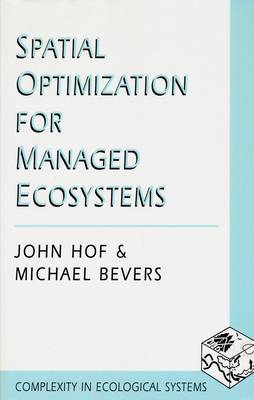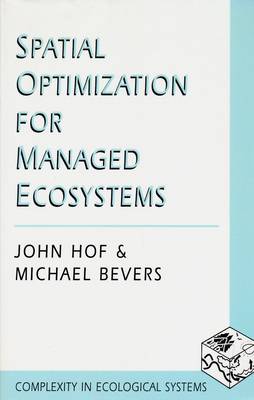
Vous voulez être sûr que vos cadeaux seront sous le sapin de Noël à temps? Nos magasins vous accueillent à bras ouverts. La plupart de nos magasins sont ouverts également les dimanches, vous pouvez vérifier les heures d'ouvertures sur notre site.
- Retrait gratuit dans votre magasin Club
- 7.000.000 titres dans notre catalogue
- Payer en toute sécurité
- Toujours un magasin près de chez vous
Vous voulez être sûr que vos cadeaux seront sous le sapin de Noël à temps? Nos magasins vous accueillent à bras ouverts. La plupart de nos magasins sont ouverts également les dimanches, vous pouvez vérifier les heures d'ouvertures sur notre site.
- Retrait gratuit dans votre magasin Club
- 7.000.0000 titres dans notre catalogue
- Payer en toute sécurité
- Toujours un magasin près de chez vous
Description
Spatial optimization is a methodology used to maximize or minimize a management objective, given the limited area, finite resources, and spatial relationships in an ecosystem. Optimization approaches can be used to evaluate a great variety of options and allow tradeoff analyses that might be impossible with other methods.
This book presents ideas and methods for directly optimizing the spatial layout of the landscape features in which an ecosystem functions. The problems Hof and Bevers address are complex, and the book relies heavily on mathematical presentations; the ideas are explained in a tutorial fashion that allows readers to grasp the general principals even if they skip the math. The first of four parts treats static spatial relationships that reflect the importance of shape, size, and proximity within an ecosystem. Part 2 considers spatial autocorrelation in a chance-constrained modeling framework. Part 3 discusses dynamic spatial changes within modeled ecosystems, and the final section focuses on diversity and sustainability. Although most discussion concerns wildlife habitat issues, the authors also include chapters on recreation, timber management, water runoff, and pest management.Spécifications
Parties prenantes
- Auteur(s) :
- Editeur:
Contenu
- Nombre de pages :
- 320
- Langue:
- Anglais
- Collection :
Caractéristiques
- EAN:
- 9780231106375
- Date de parution :
- 01-04-98
- Format:
- Livre broché
- Format numérique:
- Trade paperback (VS)
- Dimensions :
- 150 mm x 224 mm
- Poids :
- 367 g







